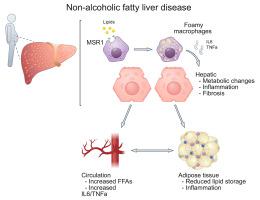Journal of Hepatology ( IF 26.8 ) Pub Date : 2021-12-21 , DOI: 10.1016/j.jhep.2021.12.012 Olivier Govaere 1 , Sine Kragh Petersen 2 , Nuria Martinez-Lopez 3 , Jasper Wouters 4 , Matthias Van Haele 5 , Rosellina M Mancina 6 , Oveis Jamialahmadi 6 , Orsolya Bilkei-Gorzo 2 , Pierre Bel Lassen 7 , Rebecca Darlay 8 , Julien Peltier 9 , Jeremy M Palmer 1 , Ramy Younes 10 , Dina Tiniakos 11 , Guruprasad P Aithal 12 , Michael Allison 13 , Michele Vacca 14 , Melker Göransson 15 , Rolando Berlinguer-Palmini 16 , James E Clark 1 , Michael J Drinnan 1 , Hannele Yki-Järvinen 17 , Jean-Francois Dufour 18 , Mattias Ekstedt 19 , Sven Francque 20 , Salvatore Petta 21 , Elisabetta Bugianesi 22 , Jörn M Schattenberg 23 , Christopher P Day 1 , Heather J Cordell 8 , Baki Topal 24 , Karine Clément 7 , Stefano Romeo 6 , Vlad Ratziu 25 , Tania Roskams 5 , Ann K Daly 1 , Quentin M Anstee 26 , Matthias Trost 9 , Anetta Härtlova 27

|
Background & Aims
Obesity-associated inflammation is a key player in the pathogenesis of non-alcoholic fatty liver disease (NAFLD). However, the role of macrophage scavenger receptor 1 (MSR1, CD204) remains incompletely understood.
Methods
A total of 170 NAFLD liver biopsies were processed for transcriptomic analysis and correlated with clinicopathological features. Msr1-/- and wild-type mice were subjected to a 16-week high-fat and high-cholesterol diet. Mice and ex vivo human liver slices were treated with a monoclonal antibody against MSR1. Genetic susceptibility was assessed using genome-wide association study data from 1,483 patients with NAFLD and 430,101 participants of the UK Biobank.
Results
MSR1 expression was associated with the occurrence of hepatic lipid-laden foamy macrophages and correlated with the degree of steatosis and steatohepatitis in patients with NAFLD. Mice lacking Msr1 were protected against diet-induced metabolic disorder, showing fewer hepatic foamy macrophages, less hepatic inflammation, improved dyslipidaemia and glucose tolerance, and altered hepatic lipid metabolism. Upon induction by saturated fatty acids, MSR1 induced a pro-inflammatory response via the JNK signalling pathway. In vitro blockade of the receptor prevented the accumulation of lipids in primary macrophages which inhibited the switch towards a pro-inflammatory phenotype and the release of cytokines such as TNF-ɑ. Targeting MSR1 using monoclonal antibody therapy in an obesity-associated NAFLD mouse model and human liver slices resulted in the prevention of foamy macrophage formation and inflammation. Moreover, we identified that rs41505344, a polymorphism in the upstream transcriptional region of MSR1, was associated with altered serum triglycerides and aspartate aminotransferase levels in a cohort of over 400,000 patients.
Conclusions
Taken together, our data suggest that MSR1 plays a critical role in lipid-induced inflammation and could thus be a potential therapeutic target for the treatment of NAFLD.
Lay summary
Non-alcoholic fatty liver disease (NAFLD) is a chronic disease primarily caused by excessive consumption of fat and sugar combined with a lack of exercise or a sedentary lifestyle. Herein, we show that the macrophage scavenger receptor MSR1, an innate immune receptor, mediates lipid uptake and accumulation in Kupffer cells, resulting in liver inflammation and thereby promoting the progression of NAFLD in humans and mice.
中文翻译:

巨噬细胞清道夫受体 1 介导非酒精性脂肪性肝病中脂质诱导的炎症
背景与目标
肥胖相关炎症是非酒精性脂肪性肝病 (NAFLD) 发病机制的关键因素。然而,巨噬细胞清道夫受体 1 (MSR1, CD204) 的作用仍不完全清楚。
方法
共处理了 170 份 NAFLD 肝活检以进行转录组学分析,并与临床病理学特征相关联。Msr1 -/-和野生型小鼠接受了 16 周的高脂肪和高胆固醇饮食。用针对 MSR1 的单克隆抗体处理小鼠和离体人肝切片。使用来自 1,483 名 NAFLD 患者和 430,101 名英国生物银行参与者的全基因组关联研究数据评估遗传易感性。
结果
MSR1 表达与肝脏载脂泡沫巨噬细胞的发生有关,并与 NAFLD 患者的脂肪变性和脂肪性肝炎程度相关。缺乏 Msr1 的小鼠免受饮食诱导的代谢紊乱,表现出较少的肝脏泡沫巨噬细胞、较少的肝脏炎症、改善的血脂异常和葡萄糖耐量以及肝脏脂质代谢的改变。在饱和脂肪酸的诱导下,MSR1 通过 JNK 信号通路诱导促炎反应。体外受体的阻断阻止了原代巨噬细胞中脂质的积累,从而抑制了向促炎表型的转变和细胞因子如 TNF-ɑ 的释放。在肥胖相关的 NAFLD 小鼠模型和人肝切片中使用单克隆抗体治疗靶向 MSR1 可防止泡沫巨噬细胞形成和炎症。此外,我们发现 rs41505344 是MSR1上游转录区的多态性,在超过 400,000 名患者的队列中与血清甘油三酯和天冬氨酸氨基转移酶水平的改变有关。
结论
总之,我们的数据表明 MSR1 在脂质诱导的炎症中起关键作用,因此可能是治疗 NAFLD 的潜在治疗靶点。
总结
非酒精性脂肪性肝病 (NAFLD) 是一种慢性疾病,主要由过度消耗脂肪和糖以及缺乏运动或久坐不动的生活方式引起。在这里,我们发现巨噬细胞清道夫受体 MSR1(一种先天免疫受体)介导 Kupffer 细胞中的脂质摄取和积累,导致肝脏炎症,从而促进人类和小鼠 NAFLD 的进展。











































 京公网安备 11010802027423号
京公网安备 11010802027423号